近义词讲解
一年级近义词反义词汇总资料讲解

一年级近义词反义词
汇总
一年级反义词、近义词汇总
反 义 词
大—小 对 -- 错 粗 -- 细 笑-- 哭 里-- 外 早-- 晚
借--还(hu cn)真--假 新--旧 重--轻 苦--甜
前 -- 后 左-- 右 快-- 慢
生-- 死 是-- 非 美 -- 丑 忙-- 闲 天-- 地 冷-- 热 问-- 答 古-- 今 轻-- 重
近义词
暖 仔细—认真 奇怪—惊奇 连忙—急忙
仿佛—好像 焦急—着急 忽然—突然 如果—假如 帮忙—帮助 专心—用心 非常—特别 仔细—细心 尊重—尊敬 到处—处处 渐渐—慢慢 办法—方法 想念—思念 常常—经常 一定—肯定 赶快—马上 美丽—漂亮 盼望—希望
高 -- 低 胖-- 瘦 开-- 关 闭—合 有-- 无 多-- 少
男-- 女 黑-- 白 长-- 短 去-- 来 进—出 近 -- 远 出 -- 入 明—暗 上—下 弯—
虚心 -- 骄傲 热情 -- 冷
淡 高兴—难过 开心—伤
心 忘记—记得 成功—失
动—静 早—晚 诚实-- 虚伪 粗心 -- 细心 温暖—寒冷 喜欢—讨厌
格外—分外 高兴—开心、快乐
喜欢—喜爱 暖和—温。
小学二年级语文近义词讲解

小学二年级语文近义词、反义词大汇总1.《秋天的图画》近义词:美丽—漂亮脸颊—面颊好像—仿佛勤奋—勤劳反义词:举起--放下燃烧--熄灭勤劳--懒惰美丽—丑陋2.《黄山奇石》近义词:闻名--著名秀丽--秀美神奇--奇妙尤其—特别好像—仿佛奇形怪状—稀奇古怪巨--大反义词:陡峭--平缓有趣—乏味神奇—普通升起--降落著名--无名3.《植物妈妈有办法》近义词:如果--假如已经--曾经告别--告辞旅行--旅游办法--方法准备--预备反义词:粗心--细心降--升仔细--马虎好--坏4.《古诗两首》近义词:尽—完赠—给径—路好景—美景反义词:斜—直晚—早远—近已无—犹有5.《一株紫丁香》近义词:疲倦--疲乏感谢--感激消除—除去安静—宁静反义词:疲倦--精神盛开--凋谢安静—吵闹感谢—埋怨6.《我选我》近义词:悄悄--默默突然--忽然亲切—和蔼(亲密)热爱--喜爱关心--关爱反义词:亲切--冷漠朋友--敌人关心--冷落热爱—憎恨7.《一分钟》近义词:非常--特别后悔--懊悔眼看--马上反义词:闹--静非常--平常迟到--准时前面—后面8.《难忘的一天》近义词:表演--示范激动—兴奋慈祥--慈爱严冬—寒冬马上—立刻和蔼-和气反义词:难忘--健忘严寒--酷暑紧张--松弛激动--平静高兴--难过满意—失望开始—结束亲切—冷淡9.《欢庆》近义词:欢乐--欢快欢庆--庆贺洁白--雪白反义词:举起--放下洁白--乌黑美好--丑恶欢乐—悲伤10.《北京》近义词:美丽--漂亮庄严--庄重宽阔—宽广矗立--耸立纪念--怀念中央—中心川流不息--络绎不绝优美—秀美反义词:美丽--丑陋中央—外围英雄--懦夫盛开--凋落许多--少许宽阔—狭窄川流不息—断断续续11.《我们成功了》近义词:不约而同--不谋而合立刻--马上聚集—集合激动--感动飘扬--飘舞反义词:成功--失败欢乐--忧伤激动--平静尽情--拘束喜讯--噩耗聚集--分散高潮—低谷不约而同—背道而驰12.《看雪》近义词:洁白--雪白惊奇--惊讶故乡--家乡到处--处处美丽—漂亮顺手—随手盼望—期盼反义词:美丽—丑陋真--假高兴--忧伤洁白—乌黑识字四:近义词:管中窥豹--坐井观天拔苗助长--欲速不达瓜熟蒂落--水到渠成反义词:徒劳无功--事半功倍13.《坐井观天》近义词:朋友--好友井沿—井边观—看无边无际--望无际反义词:朋友--敌人抬头—低头错--对坐--立14.《我要的是葫芦》近义词:从前--以前雪白--洁白自言自语--喃喃自语奇怪--奇异赛过—胜过盯—看反义词:从前--未来可爱—可恶雪白—乌黑快—慢15.《小枣树和小柳树》近义词:漂亮—美丽温和--平和得意—骄傲弯弯曲曲—曲曲折折明白--清楚反义词:好看--难看得意—失意温和—粗鲁浅--深真--假许多--少许明白--糊涂16.《风娃娃》近义词:慢慢--缓缓使劲—用劲高兴--快乐急忙--连忙感谢--感激责怪--责备容易--简单赶紧—赶快仍然—依然责怪—批评反义词:许多--少许慢慢--匆匆飞快—缓慢责怪—表扬高兴--难过帮助--刁难容易--困难17.《酸的和甜的》近义词:聪明--聪慧一定--必定明白--清楚迫不及待—急不可待开心—快乐明白—清楚连忙—急忙望—看反义词:聪明--愚蠢笑--哭开心--难过硬--软明白—糊涂18.《称赞》近义词:认真--仔细看--观高兴--快乐称赞--赞扬消除—消灭连忙—急忙泄气—动摇反义词:粗糙--细致认真--马虎仔细-粗心拿起--放下自信--自卑称赞—批评迎—送高兴—难过19.《蓝色的树叶》近义词:风景--风光注意--留意找--寻小心—当心用心—专心连忙—急忙吞吞吐吐—结结巴巴反义词:爱--恨借--还近--远吞—吐现在--从前注意—忽视吞吞吐吐—口若悬河20.《纸船和风筝》近义词:正好--恰好幸福--美满飘荡--飘扬难过--难受愿意--乐快乐--愉快反义词:幸福--痛苦难过—好受美丽—丑陋21.《从现在开始》近义词:宣布--宣告轮流--轮换神气--得意议论纷纷--众说纷纭服从--听从激动--兴奋习惯--习气反义词:开始--结束现在--从前议论纷纷--众口一词激动--平静担心--放心新—旧白天—黑夜22.《窗前的气球》近义词:突然--忽然仔细—认真高兴—快乐反义词:仔细—马虎高兴—忧伤叽叽喳喳—鸦雀无声23.《假如》近义词:快活--快乐寒冷--严寒一定--必定哭泣—抽泣反义词:寒冷--炎热缩--伸快活—忧伤哭泣—微笑24.《日记两则》近义词:小气--吝啬帮助--帮忙勤快--勤劳总是--经常兴--喜悦羡慕—艳羡反义词:羡慕—厌恶阴--晴喜欢--讨厌许多--少许白--黑小气—大方勤快—懒惰25.《古诗两首》近义词:回—归舟—船闻—听反义词:深—浅少小—老大26.《“红领巾”真好》近义词:活跃--积极机灵—灵敏爱护--爱惜反义词:快乐--忧伤机灵--呆板保护--破坏崭新--陈旧活跃—沉闷27.《清澈的湖水》近义词:欣赏--观赏风景--景色好像--仿佛扔—丢入神—入迷变化—变幻反义词:吸引--排斥清澈--浑浊许多—稀少消失--出现不满--满意头—尾28.《浅水洼里的小鱼》近义词:也许--大概继续--连续知识--学识在乎--在意忽然--突然反义词:死--活继续--停止弯--直许多—少许29.《父亲和鸟》近义词:喜欢--喜爱快活--快乐奇怪--古怪黎明--拂晓潮湿—湿润一瞬间—一刹那反义词:喜欢--讨厌动--静浓浓的--淡淡的容易—困难黎明—傍晚潮湿—干燥30.《我是什么》近义词:飘浮—飘动暴躁—急躁灾害—灾难办法--方法傍晚--黄昏平常--平时温和—温顺帮助--帮忙灾害--灾难反义词:温和--暴躁飘浮—降落傍晚—黎明31.《回声》近义词:好像—仿佛周围--四周美丽--漂亮景色--风景高兴--愉快奇怪--奇异立刻--立即反义词:高兴--难过奇怪--平常美丽—难看明白—糊涂立刻—逐渐欢快—忧伤32.《太空生活趣事多》近义词:知道--了解舒服--舒适必须--务必普通--一般安稳—平稳特殊—特别可能--或许反义词:容易--困难失去--得到舒服—难受有趣—乏味33.《活化石》近义词:观看—观赏十分--非常珍贵--名贵熟悉--熟识灭绝—灭亡缺乏--缺少稀有--少见反义词:珍贵--廉价容易--困难保护--破坏稀有--常见熟悉--陌生灭绝--滋生缺乏—充足34.《农业的变化真大》近义词:兴致勃勃--兴高采烈观看--参观成就--成果培育—培养贡献--奉献茁壮--健壮提高--增长溶解—溶化反义词:兴致勃勃--无精打采贡献--索取提高--降低盛开--凋谢引人注目--鲜为人知茁壮--柔弱先进--落后小学三年级语文近义词、反义词大汇总1.近义词:穿戴—打扮好奇—惊奇飘扬—飘动绚丽多彩—五彩缤纷安静—平静招引—吸引反义词:洁白—乌黑粗壮—纤弱安静—喧闹古老—年轻2.近义词:快乐—高兴喜爱—喜欢假装—伪装观察—观测使劲—用劲合拢—合并反义词:喜欢—讨厌合拢—张开3.近义词:汲取—吸取鼓舞—鼓励纪念—怀念终于—终究4.近义词:仔细—认真勤劳—辛劳甜蜜—甜美飘扬—飘荡有趣—风趣发颤—发抖反义词:快乐—伤心5.近义词:肯定—一定本来—原来可惜—惋惜诚实—老实反义词:肯定—否定诚实—虚假严寒—酷暑6.近义词:突然—忽然吩咐—命令立刻—马上反义词:仔细—马虎经常—偶尔7.近义词:常常—经常恐怕—估计著名—有名反义词:突兀—凹陷8.近义词:解释—说明漂亮—美丽特别—特殊反义词:失信—守信特别—普通(一般)9.近义词:希望—盼望精心—细心依然—仍然寻找—寻觅垂头丧气—无精打采渐渐—逐渐反义词:快乐—痛苦精心—粗心垂头丧气—兴高采烈希望—失望10.近义词:留意—留心凉爽—凉快五彩缤纷—五光十色反义词:紧—松火热—寒冷11.近义词:道别—告别叮咛—嘱咐掠过—拂过辽阔—广阔绽开—裂开继续—持续凉爽—凉快香甜—甘甜快活—愉快反义词:温暖—凉爽辛勤—懒惰辽阔—狭窄匆匆—慢慢12.近义词:适宜—适合大致—大概舒展—伸展苏醒—醒来艳丽—亮丽反义词:艳丽—素雅醒—睡密切—疏远干燥—潮湿13.近义词:推测—推断超常—特殊确确实实—的的确确包括—包含证实—证明反义词:减少—增加超常—一般陌生—熟悉14.近义词:看守—看护随意—随便清闲—空闲拜访—访问调节—调整反义词:细微—明显简单—复杂浪费—节约伟大—渺小15.近义词:跛—瘸忿忿—生气究竟—到底详细—详尽光滑—平滑反义词:容易—困难细小—巨大深—浅不紧不慢—慌慌张张详细—简略16.近义词:拜访—拜见迎候—等候大概—大约敬重—尊敬请教—讨教佩服—敬佩反义词:渊博—贫乏长进—衰颓闻名—无名17.近义词:混沌—模糊辽阔—广阔茂盛—旺盛滋润—润泽缓缓—慢慢华丽—华美庞大—巨大浑浊——混沌反义词:重—轻清—浊辽阔—窄小茂盛—枯萎滋润—干燥上升—下降黑暗—光明巨大—窄小会和—解散18.近义词:才干—才能美观—美丽节省—节约宝贵—珍贵精美—精致坚固—牢固反义词:减轻—加重容易—困难坚固—松散精美—粗糙19.近义词:完整—完全名扬中外—名满天下反义词:热闹—冷清清清楚楚—模模糊糊20.近义词:瑰丽—美丽庞大—巨大栖息—休息反义词:富饶—贫穷茂密—稀疏庞大—微小21.近义词:诱人—迷人欣赏—观赏抽出—长出融化—溶化葱葱茏茏—郁郁葱葱反义词:嫩—老浓—淡肥—瘦22.近义词:闪耀—闪烁乐意—愿意应有尽有—一应俱全五洲四海—五湖四海反义词:漫长—短暂清澈—浑浊热情—冷淡23.近义词:固然—确实长处—优点善于—擅长优势—优点慌张—紧张危急—紧急安全—平安依然—依旧成功—胜利反义词:防守—进攻紧张—放松长处—短处集合—分散胜利—失败24.近义词:果然—果真躲避—躲闪当初—从前故乡—家乡仍然—依旧难过—伤心也许—或许反义词:高兴—伤心25.近义词:谦虚—虚心轻蔑—轻视愤怒—生气理会—理睬覆盖—遮盖懦弱—软弱反义词:谦虚—骄傲懦弱—坚强堕落—上进26.近义词:欣赏—观赏别致—特别抱怨—埋怨匀称—均匀反义词:傲慢—谦和愚蠢—聪明荒凉—繁华误解—理解27.近义词:骤然—突然热烈—激烈镇定—镇静注视—凝视持久—长久忧郁—忧愁反义词:忧郁—开朗持久—短暂镇定—慌张28.近义词:回答—回复不假思索—毫不犹豫反义词:危险—安全29.近义词:诚挚—诚恳宽裕—富裕盼望—期望反义词:给予—索取仁爱—残酷30.近义词:羡慕—爱慕喜爱—喜欢感谢—感激调皮—顽皮恋恋不舍—依依不舍鼓励—激励普通—一般危险—凶险获得—获取宽裕—富裕仁爱—仁慈反义词:调皮—乖巧喜欢—讨厌好汉—懦汉热闹—平静清闲—繁忙。
[讲解]近义词集锦
![[讲解]近义词集锦](https://img.taocdn.com/s3/m/464076e0bb0d4a7302768e9951e79b8968026897.png)
常见实词辨析1暴发爆发爆发的近义词、拼音、意思、辨析如下:爆发bàofā 暴发bàofā【爆发】(事变)突然发生;(情绪、力量等)忽然发作。
如:1.1927年12月11日爆发的广州起义失败后,广州沉入血海之中。
【暴发】突然发财得势(多含贬义)。
又突然发作。
如:2.这个人又像土财主,又像暴发户,一生靠剥削享福。
◆辨析:“爆发”与“暴发”是同音异形的动词。
“爆发”着重于“爆”,迅猛突然地发生。
运用范围比较广,可用于火山内部岩浆突然冲破地壳,四处进出,又用于革命的力量推翻旧政权建立新政权,还用于事变的突然发生。
也指炮声、欢呼声、掌声等突然发出。
“暴发”着重于“暴”,突然而猛烈,常用于洪水的猛涨,山洪的发生,有时还指用投机或其他不正当手段突然发财的人(暴发户)。
“暴发、爆发”音同形异意义也多不同,但也有通用处,如极力控制感情的爆发(暴发)。
2抱负报复抱负(1)指手抱肩负;携带。
《后汉书·儒林传序》:“先是,四方学士多怀挟图书,遁逃林薮;自是莫不抱负坟策,云会京师。
”(2)指怀抱的志向。
. 手抱肩负。
《汉书·外戚传下·孝成赵皇后》:“世无周公抱负之辅,恐危社稷。
”《后汉书·儒林传序》:“四方之士……自是莫不抱负坟策,云会京师。
” 宋苏轼《京师哭任遵圣》诗:“平生惟一子,抱负珠在掌。
” 明李东阳《赠淑人孙母钱氏墓志铭》:“生五子六女,皆自抱负。
”2. 谓前后毗连。
唐韩愈《送汴州监军俱文珍序》:“左淮右河,抱负齐楚。
”3. 志向。
报复:打击批评自己或损害自己利益的人。
如:打击报复抱负:指远大志向。
如:抱负不凡1、报复bào fù(1) [Report]∶回复;报告回书报复元帅。
(2) [Make reprisals;Retaliate]∶古时指报恩或报仇,现指报积怨、愤恨打击报复(3) [Get even with]∶跟某人算账报复了折磨他的人。
【三则】给一年级学生讲解的近义词和反义词资料
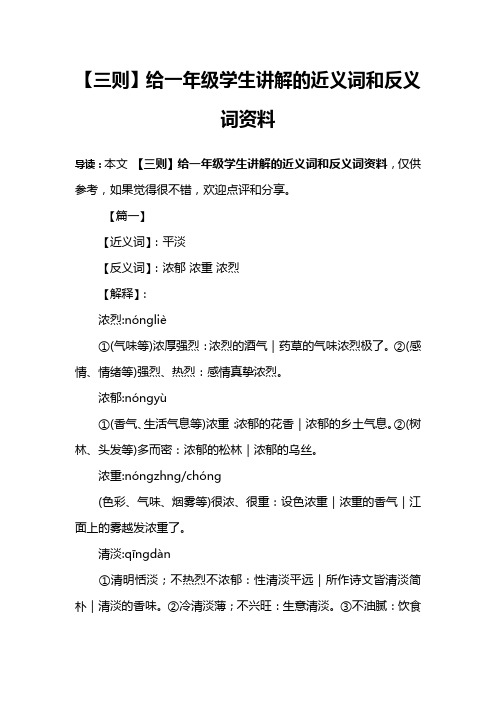
【三则】给一年级学生讲解的近义词和反义词资料导读:本文【三则】给一年级学生讲解的近义词和反义词资料,仅供参考,如果觉得很不错,欢迎点评和分享。
【篇一】【近义词】:平淡【反义词】:浓郁浓重浓烈【解释】:浓烈:nóngliè①(气味等)浓厚强烈:浓烈的酒气|药草的气味浓烈极了。
②(感情、情绪等)强烈、热烈:感情真挚浓烈。
浓郁:nóngyù①(香气、生活气息等)浓重:浓郁的花香|浓郁的乡土气息。
②(树林、头发等)多而密:浓郁的松林|浓郁的乌丝。
浓重:nóngzhng/chóng(色彩、气味、烟雾等)很浓、很重:设色浓重|浓重的香气|江面上的雾越发浓重了。
清淡:qīngdàn①清明恬淡;不热烈不浓郁:性清淡平远|所作诗文皆清淡简朴|清淡的香味。
②冷清淡薄;不兴旺:生意清淡。
③不油腻:饮食清淡。
平淡:píngdàn①平平常常;没有曲折:平淡无奇|平淡而寂寞的日子。
②特指诗文、书画作品风格自然,无雕琢痕迹:用意太过,无平淡天成之趣。
【篇二】【近义词】:停息停歇憩息休憩止息苏息休息【反义词】:久留【解释】:久留:jiǔliú长时间地停留:此地不宜~。
憩息:qìxī1.休息。
止息:zhǐxī1.休息;住宿。
2.停止;停息。
3.古琴曲名。
休息:xiū/xùxī暂停体力劳动或脑力劳动或其他活动,以恢复精力。
休憩:xiū/xùqì休息:工程结束后有一段时间好好休憩。
停息:tíngxī1.停止;止息。
停歇:tíngxiē1.休息。
2.停止……工作。
犹言辞退。
3.停止;停息。
4.歇业。
苏息:sū/sùxī1.谓更生,恢复。
暂停:zàntíng1.暂时停止。
2.体育运动术语。
某些运动项目,如篮球﹑排球﹑手球等,在比赛中,如出现意外情况,或教练员须重新布置战术时,可按规则通过裁判员暂时中断比赛,叫做暂停。
兴致的近义词讲解

兴致的近义词讲解本文是关于兴致的近义词讲解,感谢您的阅读!中文发音:兴致[xìngzhì]词语解释:指犹导致;兴趣。
近义词:趣味、兴会、兴趣、兴味用兴致造句1、我们全班兴致勃勃的去动物园玩了一天。
2、王老师讲的课很精彩,我们听的兴致勃勃3、全班同学早就集合好,兴致勃勃地向野游地进发了。
4、小明饶有兴致地读起了那本小说。
5、那位教授饶有兴致地询问我们这项发明的工作原理用兴致的近义词造句兴趣:同学们正兴趣盎然地讨论着今天的比赛。
兴味:读书会上,大家兴味盎然地谈起自己这周所看所得的心得体会。
【扩展阅读:浅谈近义词的辨析、使用】一、凡是意义相同或相近的词就叫同义词。
同义词意义完全相同,在一般情况下可以互相替代,亦称等义词。
有些词意义基本相同,但并不完全相等,应用上也不能任意互换,彼此间有一定的细微差别,属近义词。
意义完全相反或相对的词叫反义词。
二、词语是词和语的合称,包括单词、词组及整个词汇。
正确使用词语就要求掌握初中涉及的汉语词汇含义和正确使用的条件。
主要涉及到近义词的区分,易混易错词语的正确选择,以及实词、虚词等各种词性的词语在具体语境中的正确选择。
三、词的感情:词语的感情色彩是指词语在反映客观事实时所传达出的态度和感情。
包括褒义词,贬义词和中性词。
带有喜爱,赞许意味的词语叫褒义词;带有憎恶,贬斥意味的词语角贬义词;可以用在好的方面,也可以用在坏的方面,表达的是客观冷静的态度的词语叫中性词。
四、很多近义词所表示的意思看起来差不多,但实际所表达出来的意思却有一定的区别。
比如:“安静”、“宁静”都指没有声音,没有吵闹和喧哗。
“安静”重在稳定,有使安稳平静下来的意思,它有一个由喧闹到安静下来的过程。
而“宁静”重在平和,一般多指环境或心情平和安静,它描述的是一种很安静的状态或气氛。
“宁静”是高于“安静”的一种情境,除了指环境外,更多的时候是指一种心情上的安宁,是人们追求的不受外界干扰的有质量的生活境界。
逻辑填空近义词讲解

逻辑填空近义词讲解逻辑填空近义词讲解:1.词意轻重不同有些近义词的细微差别表现词意的轻重不同。
如:“称道”与“称奇”,“称道”是称述,称赞;“称奇”是称赞奇妙。
“称奇”比“称道”语意重。
又如“抱怨”与“埋怨”,“抱怨”指因不满而责怪别人,责怪的程度较重,用于人时少用于自己对自己;“埋怨”责怪的程度较轻,除用于人外,可用于事物。
2.词义侧重不同有些近义词词义侧重点不同。
如:“草率”与“轻率”,两个词同为形容词,形容做事的态度缺乏思考,粗心大意。
“草率”着重指在过短的时间里草草地了事,不细致、粗枝大叶;“轻率”着重指不慎重,随随便便,常形容说话、行动、对人的态度。
又如“淡去”与“淡忘”,“淡去”是指逐渐的离去;“淡忘”是指冷淡下去以至于忘记。
“淡去”强调客观性,“淡忘”强调主观性,侧重点不同。
3.词语范围不同有些近义词词义涵盖的范围大小不同。
如:“苍茫”与“苍莽”,“苍茫”多指夜色、水域、大地等旷远、迷茫,引申为模糊不清;“苍莽”多指树林、山岭、大地等广阔无边,引申为意境心胸开阔。
又如“目前”与“日前”,“目前”是指说话的时候,“日前”是指前几天,两个词语的范围不同,要根据语意与整个语境去填入合适的词语。
4.适用对象不同有些近义词所表示的概念相同,但是适用的对象不同,有上下、内外等之分。
如:“馈赠”与“捐赠”,“馈赠”是指赠送(礼品),“捐赠”是赠送物品给国家或集体,两个词语的适用对象是不同的。
5.语体色彩不同有些近义词词意体现出的庄重和诙谐、谦敬和讽刺、委婉和直露以及文、白、雅、俗等不同的色彩,虽然意义相同或相近,但各适用的场合并不相同,有些倾向于书面语,有些倾向于口语化。
如:“商榷”与“商量”,“商榷”是正式用语;“商量”是口语化的表达,一般用在日常生活当中。
6.感情色彩不同有些近义词词义附带的表现为感情上的某种倾向、情调不同。
如:“臆造”与“编造”,“臆造”凭主观臆想编造,是贬义词,“编造”指将资料组织排列起来,或凭想象创造(故事),是中性词。
近义词——精选推荐

考试大纲规定,考生们除了掌握考试大纲规定的5500个基本词汇以外,还应掌握词汇之间的词义关系,如同义词、近义词、反义词等。
因此,考生在复习单词时,不仅要记词更要学会去辨析,尤其对相似易混词汇应进行重点攻克。
为了方便同学们的单词复习,现对常见近义词进行归纳讲解。
1、blunder, error, mistake这一组词都表示"错误"。
blunder n. (因为无知、疏忽犯下的)大错,愚蠢的错误。
I think that I committed a blunder in asking her because she seemed very upset by my question.这位女士由于我的问题感到很难过,我感觉到犯了一个大错。
error n.指判断、计算或行为上的错误,也指智力或道义上的错误。
The accident was the result of human error.这事故是人为的错误造成的。
mistake n.误会,误解;(粗心、遗忘所导致的)错误。
I took your bag instead of mine by mistake.我错拿了你的手提包。
2、brittle, fragile, frail, crisp, invalid都有"弱"的意思。
brittle a.易碎的,易损坏的,通常是指坚硬的东西。
The bones of elderly people become brittle and easily broken.老年人的骨头变得脆弱,很容易骨折。
fragile a.常常修饰使用时必须小心才不会破碎的东西,也引申为体弱的,虚弱的。
He 's feeling a bit fragile after last night's party.他参加了昨晚的聚会以后,现在感觉有些虚弱。
frail a. (指人)体弱的,虚弱的,也可以指东西易碎的。
【三则】给一年级学生讲解的近义词和反义词资料
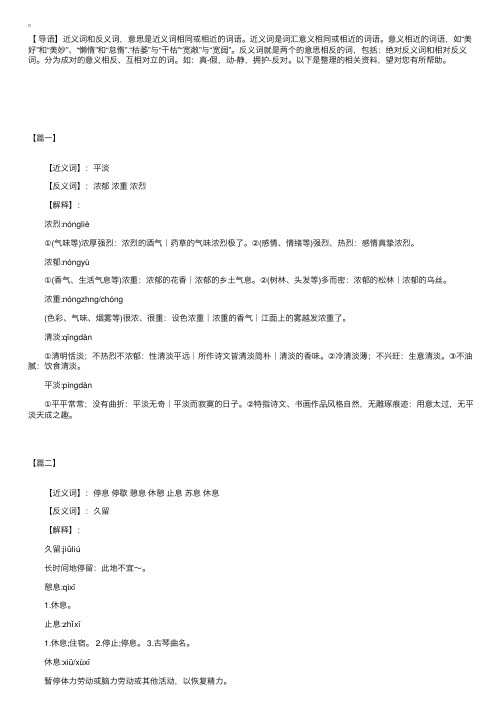
【导语】近义词和反义词,意思是近义词相同或相近的词语。
近义词是词汇意义相同或相近的词语。
意义相近的词语,如“美好”和“美妙”、“懒惰”和“怠惰”.“枯萎”与“⼲枯”“宽敞”与“宽阔”。
反义词就是两个的意思相反的词,包括:绝对反义词和相对反义词。
分为成对的意义相反、互相对⽴的词。
如:真-假,动-静,拥护-反对。
以下是整理的相关资料,望对您有所帮助。
【篇⼀】 【近义词】:平淡 【反义词】:浓郁浓重浓烈 【解释】: 浓烈:nóngliè ①(⽓味等)浓厚强烈:浓烈的酒⽓|药草的⽓味浓烈极了。
②(感情、情绪等)强烈、热烈:感情真挚浓烈。
浓郁:nóngyù ①(⾹⽓、⽣活⽓息等)浓重:浓郁的花⾹|浓郁的乡⼟⽓息。
②(树林、头发等)多⽽密:浓郁的松林|浓郁的乌丝。
浓重:nóngzhng/chóng (⾊彩、⽓味、烟雾等)很浓、很重:设⾊浓重|浓重的⾹⽓|江⾯上的雾越发浓重了。
清淡:qīngdàn ①清明恬淡;不热烈不浓郁:性清淡平远|所作诗⽂皆清淡简朴|清淡的⾹味。
②冷清淡薄;不兴旺:⽣意清淡。
③不油腻:饮⾷清淡。
平淡:píngdàn ①平平常常;没有曲折:平淡⽆奇|平淡⽽寂寞的⽇⼦。
②特指诗⽂、书画作品风格⾃然,⽆雕琢痕迹:⽤意太过,⽆平淡天成之趣。
【篇⼆】 【近义词】:停息停歇憩息休憩⽌息苏息休息 【反义词】:久留 【解释】: 久留:jiǔliú 长时间地停留:此地不宜~。
憩息:qìxī 1.休息。
⽌息:zhǐxī1.休息;住宿。
2.停⽌;停息。
3.古琴曲名。
休息:xiū/xùxī 暂停体⼒劳动或脑⼒劳动或其他活动,以恢复精⼒。
休憩:xiū/xùqì 休息:⼯程结束后有⼀段时间好好休憩。
停息:tíngxī 1.停⽌;⽌息。
停歇:tíngxiē1.休息。
近义词辨析方法与实例讲解

近义词辨析方法与实例讲解(总5页)--本页仅作为文档封面,使用时请直接删除即可----内页可以根据需求调整合适字体及大小--近义词辨析方法与实例讲解核心提示:近义词辨析是近年高考命题的一个热点,也是一个难点。
近义词涉及的范围很广、数量较大,要准确的辨析近义词,就需要结合具体语境,从词语的含义、使用对象与范围、情感色彩、语体风格、固定搭配,语法功能等方面入手。
高考《考试说明》中对词语的要求是“正确使用词语(包括成语)”。
能力层级为D级(应用)。
“词语”主要包括实词、虚词、熟语等。
通过长期观察我们从高考题型中归纳出以下特点:1. 题型以同音词、近义词的辨析为主;2. 所选实词多是生活中常见但又容易被忽视的词语;3. 干扰点为其中字面意义和整体意义不一致的词语;4. 考查重点:辨析词语的确切含义、词义轻重、适用对象和范围、搭配、语法功能、感情色彩、语体风格、语境义等。
攻克近义词辨析题要从以下几个方面入手。
一.辨析近义词的确切含义有些词语看起来意思比较接近,但这些近义词所表达的内容常有细微的差别,因此一定要理解词语的确切含义,比较其异同,这是解答此类试题的关键。
近义词示例“截止”VS“截至”;“终止”VS“中止”;“收集”VS“搜集”;“受益”VS“收益”典型例句例句1. 报名在昨天已经(截止)。
例句2. 我国大型深水港——山东石臼港的建设进展顺利,(截至)九月中旬,已完成全年施工计划的90%。
例句解析“截止”和“截至”是两个意义相近且有所区别的词,也是比较容易用错的词。
“截止”中的“止”是“停止”的意思,“截至”中的“至”是到的意思。
因此,“截止”强调的是行动的停止,不再发展;“截至”强调的是到某个时间,事件仍可能会发展。
二.辨析近义词词义的轻重有些近义词表达的内容基本相同,但在表现程度上却有轻重、深浅的不同。
近义词示例“违反”VS“违犯”;“请求”VS“恳求”;“蔑视”VS“藐视”;“希望”VS“期望”VS“渴望”典型例句例句3. 中学生要提高文化修养,不(违反)校规校纪,更不要(违犯)党纪国法。
2014小升初语文知识点讲解及训练——近义词、反义词、多义词辨析
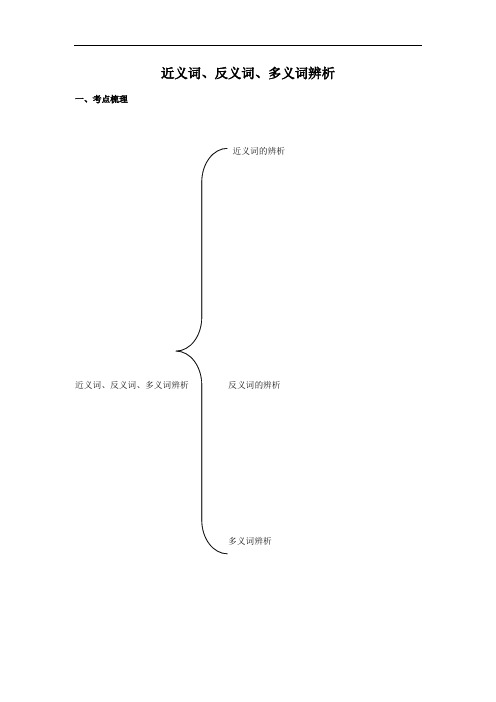
近义词、反义词、多义词辨析一、考点梳理近义词的辨析近义词、反义词、多义词辨析反义词的辨析多义词辨析二、考点讲解1. 近义词的辨析近义词就是意义相近的词,他们之间往往存在细微的差别,在运用时一般不能相互替代。
对近义词的辨析就是要抓住这一点,从以下5个方面进行:(1) 词义的轻重。
➢如热爱”与“酷爱”;(2) 范围的大小。
➢如战斗”与“战役”;(3) 适用的对象。
➢如:“关心”与“关怀”;(4) 搭配的习惯。
➢如“改善——生活”“改进方法”;(5) 感情色彩。
➢如“果断”与“武断”。
2. 反义词的辨析反义词就是意思相反或相对的词。
不是所有的词都有反义词。
反义词中形容词最多,还有少量的动词和个别的名词。
辨析反义词主要从以下几个方面进行:(1) 先分解再组合。
我们可以把指定的词语按词素分开,然后找出每个词素的相反意义的词素,最后将各自相反的词素合起来就是要找的反义词。
➢如高大”,可以分解为“高”和“大”两个词素。
高——矮,大——小,“高大”的反义词就是“矮小”;(2) 造句辨析。
先用指定的词说一句话,然后用恰当的反义词替换这个词,如果两句话表达的意思相反,就证明这个词是要找的反义词。
➢如:在学习上,他很谦虚,成绩稳步上升。
在学习上,他很骄傲,成绩差慢慢地下滑。
可见“谦虚”的反义词是“骄傲”;(3) 加“不”字辨析。
先在指定的词前加上一个“不”字,再琢磨表达“不XX”意思的一个合适的词语,就是要找的反义词。
➢如“清晰”加“不”字“不清晰”,那就是“模糊”;(4) 从感情色彩上辨析。
一般反义词的感情色彩也都相互对立,找出与原词感情色彩相反的词即可。
➢如:□如悬河——夸夸其谈。
3.多义词辨析多义词就是指具有多种相关意义的词。
辨析多义词首先要弄清它的本义,然后根据具体的语言环境分析它的引申义或比喻义。
➢如:“入木三分”原是形容书法笔力强劲的,后来也比喻见解、议论十分深刻。
三、易错提示1、词义辨析是近几年各类考试命题的一个热点,也是一个难点。
两字近义词
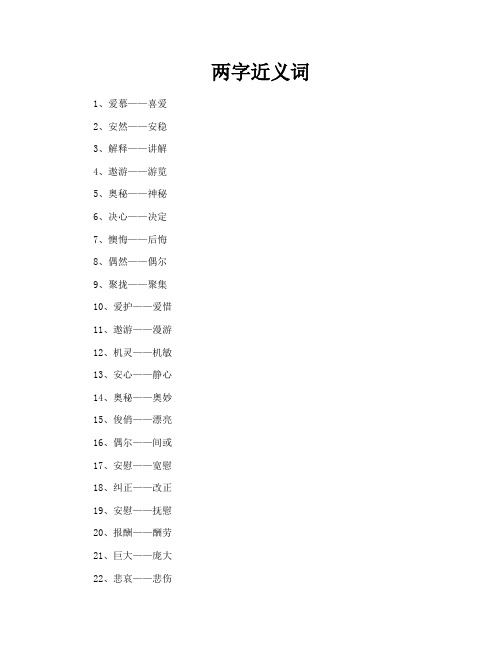
两字近义词1、爱慕——喜爱2、安然——安稳3、解释——讲解4、遨游——游览5、奥秘——神秘6、决心——决定7、懊悔——后悔8、偶然——偶尔9、聚拢——聚集10、爱护——爱惜11、遨游——漫游12、机灵——机敏13、安心——静心14、奥秘——奥妙15、俊俏——漂亮16、偶尔——间或17、安慰——宽慰18、纠正——改正19、安慰——抚慰20、报酬——酬劳21、巨大——庞大22、悲哀——悲伤24、渴望——渴求25、必然——必定26、避免——幸免27、宽广——广阔28、必须——一定29、抱怨——埋怨30、慷慨——大方31、比美——媲美32、宝贵——珍贵33、可惜——惋惜34、悲哀——悲痛35、避开——躲开36、恐怖——恐惧37、悲惨——悲凉38、悲惨——凄惨39、愧疚——内疚40、报答——答谢41、碧绿——翠绿42、劳苦——劳累43、包括——包含44、本领——本事45、立即——马上47、半晌——半天48、灵便——灵活49、猜测——推测50、才干——才能51、浏览——扫瞄52、采用——采纳53、慈悲——慈善54、良好——优良55、慈祥——慈爱56、葱茏——葱郁57、连绵——绵延58、聪明——聪慧59、催促——督促60、凉爽——凉快61、催促——督促62、诧异——惊异63、冷淡——冷漠64、颤动——抖动65、沉浸——沉醉66、灵活——灵敏67、惩罚——惩处68、迟延——拖延70、耻笑——讥笑71、耻笑——嘲笑72、满意——中意73、憧憬——向往74、酬谢——答谢75、漫步——闲逛76、啜泣——抽泣77、创造——制造78、茂密——茂盛79、绰号——外号80、沉静——寂静81、渺小——微小82、陈设——陈列83、沉思——深思84、描绘——描述85、从容——镇定86、传授——教授87、猛烈——强烈88、成功——胜利89、踌躇——犹豫90、朦胧——模糊91、沉积——淤积92、沉寂——沉静93、弥漫——布满94、觉察——发觉95、倘若——假如96、密切——紧密97、驰过——经过98、沉默——安静99、勉励——鼓励100、持续——延续101、颤抖——发抖102、藐视——轻视103、灿烂——明媚104、传说——传闻105、泯灭——消灭106、慈祥——慈爱107、打扮——装扮108、摹仿——模仿109、打搅——打扰110、胆怯——害怕111、模范——榜样112、淡忘——忘却113、叮嘱——嘱咐114、萌芽——发芽116、对付——应付117、命令——指示118、对照——对比119、诞生——降生120、茂密——稠密121、短暂——瞬间122、独特——特别123、迷蒙——迷茫124、打扰——打搅125、担心——放心126、马上——立刻127、陡峭——峻峭128、悲哀——悲伤129、忙碌——劳碌130、遍布——遍及131、便捷——便利132、鸟瞰——俯视133、恩赐——赏赐134、飞驰——奔驰135、凝结——凝聚136、发布——公布137、发誓——宣誓139、发展——进展140、繁殖——生殖141、挪移——移动142、反抗——抵抗143、防御——防备144、难过——难受145、妨碍——阻碍146、分量——重量147、能手——专家148、分外——格外149、愤怒——愤慨150、偶尔——间或151、锋利——锐利152、服侍——侍侯153、便宜——廉价154、浮现——出现155、赋予——给予156、哺育——培育157、分辩——辩解158、富裕——宽裕159、判断——推断160、嘱咐——叮嘱162、批评——批判163、峰峦——山峰164、发愣——发呆165、僻静——偏僻166、覆盖——掩盖167、乏味——无聊168、疲倦——疲乏169、仿佛——好像170、吩咐——命令171、漂亮——美丽172、防御——抵御173、烦恼——烦闷174、飘荡——漂浮175、费解——难懂176、防止——预防177、品格——品行178、费用——花费179、反驳——反对180、朴实——质朴181、告别——告辞182、恭敬——尊敬183、盘问——追问185、鼓励——鼓舞186、盘曲——盘旋187、固然——当然188、故意——有意189、平等——公平190、关心——关怀191、管理——治理192、奇妙——奇异193、贯通——贯穿194、瑰宝——珍宝195、气魄——气势196、规划——计划197、果然——果真198、气势——气概199、鼓励——鼓舞200、高悬——高挂201、清晰——清楚202、干枯——枯萎203、感叹——感慨204、清澈——清亮205、公正——公平206、观赏——欣赏207、清晰——清楚208、给予——送给209、感激——感谢210、驱赶——驱逐211、感触——感受212、高兴——难受213、凄苦——凄凉214、孤单——孤独215、赶紧——连忙216、勤奋——勤劳217、估计——估测218、感动——感激219、观赏——欣赏220、含糊——模糊221、寒冷——严寒222、轻蔑——轻视223、和蔼——和气224、宏伟——雄伟225、确实——实在226、欢跃——喜悦227、荒芜——荒凉228、轻柔——柔和229、回顾——回忆231、弱小——微小232、获取——猎取233、罕见——少见234、热闹——喧哗235、和蔼——温和236、昏暗——阴暗237、认真——仔细238、缓慢——缓缓239、忽然——突然240、容许——允许241、呼喊——叫喊242、呼唤——召唤243、饶恕——宽恕244、呵护——保护245、湖边——湖畔246、松散——疏松247、好像——似乎248、会晤——会见249、思考——思索250、活泼——生动251、好梦——美梦252、赏识——赞赏254、害怕——畏惧255、伤害——损害256、荒芜——荒凉257、妒忌——嫉妒258、商议——商量259、机灵——灵巧260、积累——积存261、稍微——略微262、即将——马上263、疾驰——飞奔264、刹那——瞬间265、寄托——寄予266、皎洁——洁白267、神奇——奇妙268、讥笑——嘲笑269、坚固——牢固270、率先——领先271、坚毅——坚强272、艰苦——艰难273、肃静——安静274、建造——建筑275、交织——交错276、闪烁——闪耀277、娇嫩——柔嫩278、节制——克制279、生气——生机280、竭力——尽力281、解救——拯救282、四处——到处283、谨防——防备284、谨慎——慎重285、所有——全部286、惊险——危险287、精密——周密288、审视——审察289、精致——精巧290、敬仰——仰慕291、索性——干脆292、境界——境地293、居然——竟然294、探索——探究295、绝望——无望296、惊叹——惊奇297、推荐——推举298、惊恐——害怕300、妥帖——稳妥301、见谅——原谅302、敬佩——佩服303、同伴——伙伴304、结束——完毕305、决口——决堤306、同意——愿意307、聚集——集合308、积蓄——积攒309、蜿蜒——曲折310、居然——竟然311、拮据——困难312、顽强——坚韧313、教导——教育314、焦急——着急315、巍峨——雄伟316、洁净——干净317、集合——集中318、惟独——只有319、惊讶——惊奇320、寂寞——孤单321、危急——危险323、维护——保护324、吸收——汲取325、稀罕——希奇326、稀罕——希奇327、稀罕——希奇328、形态——状态329、幼稚——稚嫩330、预计——估计331、滋味——味道332、照射——照耀333、终于——最终。
五年级下册语文基础专项讲解近义词全国通用

五年级下册语文基础专项讲解近义词全国通用知识图谱-近义词、反义词、多义词和同音词近义词反义词多义词同音词第09讲_近义词、反义词、多义词和同音词错题回忆近义词、反义词、多义词和同音词知识精讲一、要点梳理(一)近义词1.二字词语喜爱—喜爱安稳—安稳隐秘—奇异后悔—后悔酬劳—酬劳悲伤—悲伤倒塌—倒塌必定—必定幸免—幸免廉价—廉价培育—培养推测—估量才能—才能采纳—采纳跳动—抖动沉醉—沉醉惩处—惩戒拖延—拖延嘲笑—嘲笑酷热—酷热向往—向往答谢—答谢抽泣—抽泣制造—制造外号—外号慈善—慈善慈爱—慈爱葱郁—葱郁聪慧—聪慧督促—督促辉煌—明亮装扮—装扮打搅—打搅可怕—可怕忘却—忘却顽皮—淘气叮嘱—叮嘱嫉妒—嫉妒应付—应对对比—对比赏赐—赏赐公布—公布宣誓—宣誓进展—进展繁育—生殖抵抗—抗击防备—防范阻碍—阻碍重量—重量格外—格外愤慨—愤慨锐利—锐利侍侯—侍侯出现—显现给予—给予辞别—告辞尊敬—尊敬估量—估量鼓舞—鼓舞因此—因此有意—有意关怀—关怀治理—治理贯穿—贯穿珍宝—珍宝模糊—模糊冰冷—严寒和气—和气宏伟—雄壮欢呼—欢乐围绕—围绕荒凉—荒凉回忆—回忆聚拢—汇合猎取—猎取祸害—祸害机警—灵活积存—积存立即—赶忙飞奔—飞奔寄予—寄予嘲笑—嘲笑牢固—牢固坚决—坚强困难—艰巨艰巨—困难建筑—建筑交错—交错柔嫩—柔嫩克制—克制尽力—尽力挽救—挽救防备—防范慎重—慎重危险—危险周密—周密精巧—精巧仰慕—仰慕境域—境地难道—难道开创—开发大方—大方惋惜—惋惜空闲—闲暇恐惧—惧怕操纵—操纵招待—招待内疚—内疚劳累—劳累清晨—拂晓赶忙—赶忙灵活—灵活领会—领会扫瞄—扫瞄郑重—盛大沦落—沦落排列—排列中意—中意闲逛—闲逛茂盛—茂盛模糊—模糊充满—布满紧密—紧密鼓舞—鼓舞将就—牵强轻视—轻视消灭—消灭鲜艳—明媚突然—突然榜样—榜样俯视—俯视凝聚—凝聚凝视—凝视移动—移动偶然—间或判定—推断批判—批判疲乏—疲乏疲乏—疲乏偏僻—偏僻漂亮—漂亮飘动—漂浮漂动—漂动品行—品行终生—终生无能—平凡平坦—平坦一般—一样凌辱—凌辱奇异—奇特鄙视—卑视气概—气概气概—气概启发—启发清晰—清晰天地—天地埋伏—埋伏声讨—批判闲适—中意亲热—亲热轻视—轻视轻巧—轻快纯洁—纯洁清晰—清晰驱逐—驱逐微小—微小损害—损害商量—商量商量—协商略微—略微奢侈—奢侈奇异—奇异奇异—奇异奇异—奇特批阅—批阅有用—有用舒服—舒服考虑—摸索侍奉—侍奉寂静—安静素养—素养领先—领先贪欲—贪欲探究—探究躲避—躲避专门—专门抄写—抄写风光—风光品味—体会举荐—推举稳妥—稳妥曲折—曲折坚强—坚强坚强—顽固仿佛—看起来犹如—犹如仿佛—看起来仿佛—犹如宏伟—雄壮只有—只有危险—危险跟随—跟随托付—托付温顺—和气温顺—温柔吸取—汲取希望—期望稀奇—希奇突击—突击恐吓—恐吓鲜亮—鲜亮仰慕—艳羡一直—一直消逝—消逝休息—休息观赏—观赏新奇—新奇兴盛—兴盛或许—或许凶残—凶狠雄壮—宏伟修建—修建惭愧—惭愧秀丽—秀丽慢慢—慢慢平常—平常查找—查找连续—连续严峻—严肃眺望—眺望挟制—挟制依旧—仍旧游玩—巡游油黑—乌黑稚嫩—稚嫩估量—估量情愿—情愿承诺—同意临时—临时阻止—阻止赞扬—观赏赞扬—颂扬责备—批判占据—占据照耀—照耀照管—照管宝贵—宝贵冷静—平复战胜—降服挽救—挽救争吵—争吵希望—希望突然—突然凝视—凝视查找—查找戏弄—戏弄强壮—健壮味道—味道尽情—尽情堵塞—堵塞恰好—刚好俏丽—漂亮厌恶—厌恶冷静—冷静坚强—坚强推测—估量稀薄—淡薄争辩—争辩妥善—妥当埋伏—埋伏明显—明显迷糊—模糊蔓延—扩散舒展—展开驱逐—驱走误解—误会迫害—破坏赞扬—颂扬迷恋—沉迷祸害—灾祸突然—突然宽敞—宽敞希望—期望照管—照管疲乏—困倦恳求—要求朴素—俭朴处罚—惩处阻碍—阻碍明了—明白风险—危险鼓舞—鼓舞安慰—安慰新奇—新奇出生—产生嘹亮—嘹亮抵御—抵挡奇异—奇异期望—希望隐藏—隐藏奇异—精妙安静—安静立即—赶忙清晨—早晨宝贵—贵重慈善—仁慈茂盛—茂盛连续—连续鲜艳—鲜艳假如—假如靠近—靠近彻低—完全精巧—精美瞭望—眺望奉献—奉献矫健—强健果然—果真谦虚—谦逊迷漫—迷漫证实—证明联系—联络悦耳—动听2.四字词语五光十色—五彩缤纷连续不断—连续不断若隐若现—时隐时现独树一帜—独具匠心不计其数—不计其数风土人情—风土人情毫不犹疑—坚决果断费尽心机—费尽心机力倦神疲—力倦神疲绝然不同—绝然不同文明遐迩—闻名遐迩全神贯注—全神贯注移山倒海—移山倒海川流不息—川流不息眉飞色舞—眉飞色舞聚精会神—全神贯注移山倒海—移山倒海力倦神疲—筋疲力竭千锤百炼—千锤百炼不由自主—不由自主不可一世—不可一世为所欲为—为所欲为同心同德—同心同德自由自在—自由悠闲乐不可支—乐不可支凄风苦雨—凄风苦雨如数家珍—如数家珍恋恋不舍—恋恋不舍无奇不有—无奇不有天天与共—天天相处惊天动地—响彻云霄(二)反义词1.二字词语洁白—乌黑漂亮—丑陋认真—马虎辞别—会合舒服—难受粗心—细心动身—归来安静—喧闹宽敞—狭窄困难—容易喧闹—安静闲暇—忙碌打开—关闭流淌—固定温顺—冰冷弯曲—笔直微笑—悲伤仰头—低头开始—终止现在—今后喜爱—厌恶轻巧—繁重机警—愚笨明白—糊涂期望—败兴傍晚—清晨隐秘—公布高大—矮小坚决—坚决张开—合拢经常—偶然愤慨—快乐坚决—犹疑清晰—模糊熟悉—生疏爱护—破坏勇敢—懦弱聪慧—愚蠢失败—成功放开—关闭飞速—缓慢明白—糊涂苦恼—快乐专门—一样专门—一般漂亮—丑陋快乐—难过认真—粗心杰出—枯燥洁净—肮脏心爱—厌恶安静-动荡极小—极大温顺—急躁好事—坏事奔驰—停止幸福-痛楚坚硬—松软堵塞—畅通贵重—廉价锐利—迟钝集合—分散新奇—陈旧破裂—完整以后—现在诚实—狡猾可爱—可恨爽朗—呆板赶忙—拖延透亮—浑浊凉快—炎热永久—短暂凉快—闷热宽敞—狭小相信—怀疑裂开—合拢相信—怀疑节约—白费亲热—疏远高超—低劣喧闹—冷清强壮—虚弱牢固—松散严肃-爽朗凝聚—离散陡峭—平坦伟大—微小精美—粗俗温顺—凶残沸腾—沉静壮美—晦暗出现—消逝静寂—嘈杂廉价—昂贵故交—新交曲折—笔直凝聚-溶解模糊—清晰古老—现代兴奋—忧愁漂亮—丑陋天堂—地狱模糊—清晰仰慕—不屑凶残—温柔不识—相识舒服—难受蜷缩-伸直懒惰—勤快富裕—拮据隐藏—公布平坦—坎坷脆弱—坚强干燥—潮湿增长—减短崭新—陈旧宁静—吵闹简单—复杂勇猛—怯懦邻近—遥远冰冷—温顺温柔—凶狠尽职—失职轻巧—笨重休息-工作平坦-陡峭善良-凶狠片刻-长久僵硬-柔软凝视-扫视敏锐-迟钝冷静-惊慌廉价-昂贵喜爱-厌恶狰狞-慈爱贫瘠-肥沃强大-微小倒霉-幸运温柔-粗暴批判-夸奖担忧-放心倔强-柔顺明白-糊涂相信-怀疑稀少-稠密狭窄-宽敞慌忙-镇定毅然-犹疑方便-苦恼合拢-张开昏暗-明亮爱护-破坏缺失-受益清晰-模糊干燥-潮湿熟知-生疏担忧-放心痛楚-欢乐有意-无意防备-进攻奇异-一般严峻-轻微茂盛-稀疏模糊-清晰温顺-凶狠可爱-厌恶黑暗-光明悦耳-刺耳损害-爱护进展-落后拥有-失去吝啬-大方稚嫩-成熟辉煌-黯然团结-分裂兴盛-衰败专门-一般鄙视-重视示弱-逞强杰出-无能恶劣-良好显要-卑微拖延-提早惩处-奖励高大-矮小破裂-完整拒绝-同意狭窄-宽敞增加-减少朴素-奢侈轻视-尊重贫穷-富裕诚心-假意酥软-坚硬炎热-冰冷认真-马虎空虚-充实伶俐-笨拙晦暗-明亮繁荣-衰败淘气-老实大致-精确杰出-一样自豪-谦虚悲伤-欢乐乌黑-明亮节约-白费宽容-狭隘牢固-松散超常-失常简单-豪华专门-平常高大-瘦弱精巧-粗糙凉快-温顺懦弱-坚强消逝-显现险峻-平缓茂盛-枯萎穷苦-富足沮丧-兴奋集中-分散潮湿-干燥统一-分裂孤寂-喧闹危险-安全悲伤-愉快承诺-禁止凝聚-分散粗糙-光滑藏匿-公布郑重-随意高昂-低落悠闲-拘谨扩大-缩小柔和-严格坚强-脆弱衰老-年轻淡雅-浓艳清醒-糊涂熟识-生疏倾斜-竖直复杂-简单深沉-肤浅确信-否定团结-分裂明朗-阴森迂回-径直残破-完整簇拥-分散陡峭-平缓沉着-惊慌坎坷-平坦严寒-酷暑挺进-撤退深奥-浅显详细-简略贫瘠-肥沃佩服-鄙视迅速-缓慢重逢-离别偶然-经常稀奇-平常平常-专门迅猛-缓慢杰出-糟糕放肆-慎重及时-耽搁厄运-好运厌倦-喜爱无能-优秀机警-笨拙漂浮-沉没精细-粗糙宽敞-狭小奇异-无能专门-一样黯然-鲜亮关怀-冷落真理-谬误绽放-枯萎开放-封闭疑问-坚信强大-衰弱尊重-侮辱失信-守信挖掘-埋没承担-推辞约莫-一定估量-确信冷静-紧张笨重-轻巧临时-长期2.四字词语独树一帜—普一般通熙熙攘攘—冷冷清清心惊肉跳—冷静自如义正词严—理屈词穷一朝一夕—日久天长悔过自新—执迷不悟群策群力—孤掌难鸣废寝忘食—饱食终日沸沸扬扬—鸦雀无声翻来覆去—简单明了吵吵嚷嚷—冷冷清清唇枪舌剑—心平气和粗制滥造—精雕细刻安居乐业—颠沛流离名副事实上—名不副实雪中送炭—雪上加霜歪歪斜斜—端端正正风平浪静—狂风恶浪迷迷糊糊—清清晰楚全神贯注—心不在焉断断续续—连续不断赏心悦目—触目惊心一丝不苟—粗心大意力倦神疲—精力充沛万马奔腾—无声无息吞吞吐吐—干干脆脆毫不犹疑—犹疑不决(三)同音词1.融解、溶化、熔化融解:(冰、雪等)变成水。
二年级语文上册近、反义词资料讲解
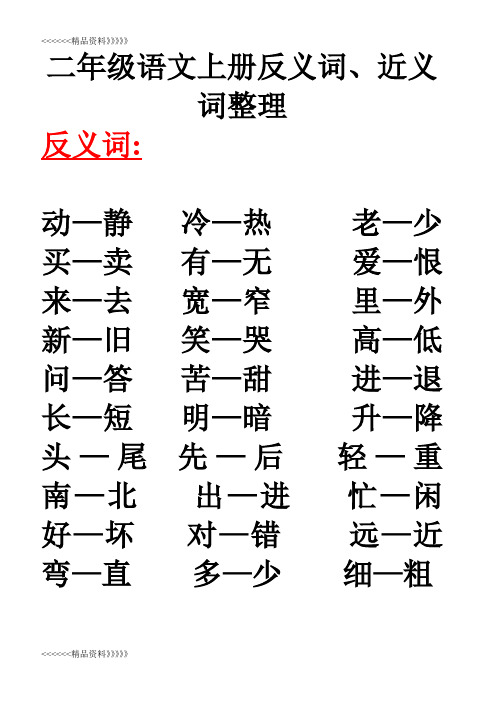
二年级语文上册反义词、近义
词整理
反义词:
动—静冷—热老—少买—卖有—无爱—恨来—去宽—窄里—外新—旧笑—哭高—低问—答苦—甜进—退长—短明—暗升—降头—尾先—后轻—重南—北出—进忙—闲好—坏对—错远—近弯—直多—少细—粗
胖—瘦真—假早—晚软—硬古—今反—正活—死高—矮出—入熟—生美—丑借—还快—慢饿—饱
难看—漂亮难过—高兴喜欢—讨厌温暖—寒冷敌人—朋友高兴—生气
粗心—细心成功—失败进步—落后认真—马虎安全—危险复杂—简单
浪费—节约近义词:
高兴—快乐朋友—伙伴小心—仔细好玩—有趣着急—焦急美丽—漂亮中心—中央著名—有名特别—非常景色—风景壮美—壮丽勤劳—勤快好像—仿佛尤其—特别疲倦—疲劳安静—宁静消除—去除关心—关怀
闻名中外——举世闻名奇形怪状——千奇百怪
热爱—喜爱突然—忽然。
- 1、下载文档前请自行甄别文档内容的完整性,平台不提供额外的编辑、内容补充、找答案等附加服务。
- 2、"仅部分预览"的文档,不可在线预览部分如存在完整性等问题,可反馈申请退款(可完整预览的文档不适用该条件!)。
- 3、如文档侵犯您的权益,请联系客服反馈,我们会尽快为您处理(人工客服工作时间:9:00-18:30)。
wish /hope用法表述wish hope 异同点希望自己去做……I wish to see you againsoon.我希望很快再见到你。
Do you wish to speak atthe meeting?你希望他能帮你一把。
I hope to see you again soon.我希望很快再见到你。
Do you hope to speak at themeeting?你希望能在会上发言吗?两词均可接不定式作宾语,意思一样。
希望别人去做……I wish him to help you.I wish he may help you.我希望他能帮你一把。
I hope him to help you. ×I hope he may help you. ∨我希望他能帮你一把。
Hope不可接复合宾语,只能接宾语从句。
希望将来会……×××It’s too hot. I hope therewill be a strong wind lateron.天太热了,我希望马上刮一场大风。
我希望将来会发生的情况只用hope不用wish.预祝别人……I wish you good luck.我祝你好运。
We wish you a happybirthday.我们祝你生日快乐。
×××Wish可接双宾语,而hope则不可以。
应答(肯定或否定)×××Will he be there on timetomorrow?明天他将准时到达那里吗?—I hope so. —希望如此。
(or: I hope not. 但愿他不能。
)此时只用hope ,而wish没有此种用法。
bring/ take/ get/ carry这几个词都有“拿”、“带”之意。
bring指从别处把某人或某物带到说话的地方:take指从说话的地方把某人或某物带到别处;get一般与go连用,go and get,表示专程到别处去把某人或某物“带来”,“请来”。
“拿来”、“取来”之意;carry 表示“携带”,“提、扛、抬、抱”,“载运”等,具有负重含义,不表示固定方向。
如:Bring your dictionary to school tomorrow, please.明天请把你的词典带到学校来。
They took the boy to hospital at once. 他们把男孩子立刻送到医院。
Please go and get some chalk.请去拿回些粉笔来。
He was carrying a heavy box for the old woman. 他正替那位老太太提着一只重箱子。
when和what time这两个疑问词均可译为“什么时候/间,”一般情况下是可相互换用的,但也要注意差别。
When意为“何时”时,常用于对一个具体的时间进行提问,如对“this afternoon”“last week”“today”等提问时,一般用when。
对由“after”“before”等所引导的时间状语从句提问时,也用when,如:He is going shopping when his mothercomes back.→When is he going shopping?(注意原句中的when意为“当……时候”,引导时间状语从句,而变化后的句子中的when则是疑问词,意为“什么时候”)而what time 往往用于对一个具体的时间提问(具体到几点几分),如:A: What time do you go to bed every night? B: At a quarter to ten.若对一个既有具体时间又有抽象不具体的时间状语提问时,则只能用when,如:I got up at five yesterday morning. →When did you get up?用what time提问的句子一般再不能用抽象时间回答,而用when提问的问句却可用具体时间回答。
如:A: When do you get up every day? B: I get up at five thirty.…-year-old / …year(s) old 二者前面都要用基数词,均有“……岁(的)”之意。
但…-year –old是复合形容词,其中的名词year只能用单数形式,中间用连字符号,一般仅作定语。
如: Lucy is an eleven -year-old girl. 露茜是一个十二岁的小女孩。
…year(s) old 是一个形容词组,year用单数还是复数取决于其前面的基数词。
在口语中,常省略year (s) old, 只用基数词。
多用作表语或介词of的宾语。
如:I’m thirteen (years old). 我十三岁了。
That’s a baby of only one (year old). 那是个才一岁的婴儿。
a bit / a little a bit 与 a little这两个词都意为“一点儿”,有时可以互换使用,有时却不能。
现将二者用法之异同辨析如下:1)两者可以相互替换的情况:(1)二者作程度副词修饰形容词、副词、动词或比较级时,意义相同,表示“一点儿”、“有些”。
如:I am a bit / a little hungry. 我有点饿。
He walked a bit / a little slowly. 他走路有点慢。
Please wait a little / a bit. 请稍等一下。
Could you come here a little / a bit earlier next time? 下次能不能来早点?(2)二者可以作名词词组,充当主语或宾语。
如:A little / bit is enough for me. 我有一点就够了。
I know only a little / a bit about her. 我对她的情况只了解一点。
2) 两者不能相互替换的情况:(1)a little 可以直接修饰名词;a bit后跟of才可以。
如:There is a little water in the bottle. There is a bit of water in the bottle. 杯子里有点水。
(2)否定形式,not a little作状语,相当于very / quite,意为“很”,“非常”,作定语和宾语时,相当于much,意为“许多”;not a bit 作状语时,相当于not at all, 意为“一点也不”,作宾语时则相当于not much。
如:He is not a little (=very) hungry. 他饿极了。
He is not a bit (=not at all) hungry.他一点也不饿。
There is not a little money. 还剩下许多钱。
She didn’t spend a bit on books. = She didn’t spend much on books. 她在书上不花什么钱。
(3)not a bit中的not可以分开使用;not a little中的not则不能分开。
如:He felt not a bit tired. = He d idn’t feel a bit tired. 他觉得一点也不累。
He felt not a little tired. 他觉得非常累。
但不能说:He didn’t fell a little tired.a little, little; a few, few 这两组词存在一定的差别。
它们作为限定词修饰名词时,a little,little需与不可数名词或专有名词连用,而a few,few一组要与可数名词复数连用,起修饰限定数量的作用。
little,few意义接近,意思是“几乎没有”,否定含义较重;a little,a few意思是“一些”,相当于some,肯定成分较多。
需要注意的是,a little,little 一组可以是程度副词,而a few,few没有这种词性。
如: I can speak a little English. 我能够讲一点英语。
There is little ink in the bottle. 瓶子里几乎没有墨水了。
There is still a little meat in the fridge. 冰箱里还有一点肉。
There are few children outside. It is raining now.外面几乎没有孩子了. 天现在正在下雨。
There are a few chairs in the classroom. 教室里有一些椅子。
How do you like fried chicken? A little.你觉得炸鸡怎么样?有一点点喜欢.a lot of, a number of, a great deal of, many, much, the number of, plenty of, lots of 1) There are ________ books in the school library. 答:a lot of。
意为“许多”,修饰可数名词复数books。
此处也可用many,a number of 代替。
2) The rich had ______ money, but he wasn’t happy.答:a lot of。
意为“许多,大量”,修饰不可数名词 money。
此处可用 a great deal of和much代替。
3)There are _______ people in the street.答:lots of。
意为“许多”,可用a lot of,a number of,plenty of,many代替。
4) Today I have ______work to do.答:a great deal of。
意为“许多”,修饰不可数名词work。
可用a lot of (much)代替。
5) How ________birds are there in the tree? Five.答:many。
意为“许多”。
How many 意为“多少”,修饰可数名词复数birds。
6) How______ are the Potatoes?答:much。
意为“许多”。
询问多少钱或时间用how much。
谓语动词根据后面的主语确定。
7)______the boys in our term is twenty-eight.我们组男孩的数字是28个。
